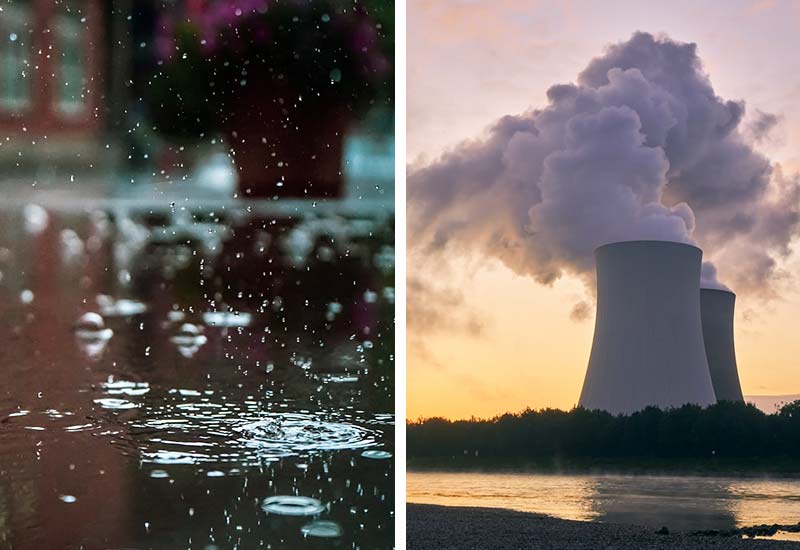What is the difference between weather and climate? And why is it even important to separate the two terms? If you're looking for answers to these questions and are also unsure what exactly weather means, you've come to the right place!
Climate change concerns us all - and will affect us all sooner or later if we don't act. Vague claims, lies and assumptions about climate change Relationship between extreme weather and global warming are absolutely out of place here.
In this article, I would therefore like to explain to you exactly how weather and climate differ from each other and why they are nevertheless closely connected. Let's go!
Why should everyone know the difference between weather and climate?
If there is a devastating extreme weather event or a destructive natural disaster, there are always people who have a Connection to the Climate Change produce and those who deny them. As a rule, the same questions always arise:
- How much is the event linked to climate change?
- Has the weather become more extreme in general?
- Are weather and climate the same thing?
- Who is mainly responsible for climate change?
And the question "Does climate change even exist?"which is usually asked by climate change deniers, we quickly answer YES at this point, since the Science agrees.
On the connection between weather events and climate change, there are many bold claims - the facts are non-existent or relatively unclear on the shelf. This is another reason why a clear understanding of the terms weather and climate, as well as their interrelationships, is necessary.
How do weather and climate differ from each other?
Now we come to the core of this article: So what exactly is the difference between weather and climate - and what actually is weather? To find out, let's simply use the Definitions of terms with each other.
Book Tip: If you want to delve deeper into the topic, I highly recommend the book Angry weather by the physicist Friederike Otto. Get it here*.
What is the weather?
The weather describes the physical state of the atmosphere at a given time in a given place.1 It shows us whether it is currently hot or cold, sunny, cloudy or rainy, dry or damp and windy or calm.
We can use this information, for example, to Plan day and dress accordingly.
Weather reports also enable us to prepare for the calculated weather conditions for the following days to adjust. Individual private individuals, but also agricultural businesses or logistics and road construction companies, for example, benefit from the improved planning options.
What is the weather?
Under the weather is understood the general, average or even predominant character of the weather pattern of a certain period of time.2
The period of time considered ranges from a few days to seasons. The prevailing weather situation ultimately determines the Characteristic the weather.
What is the climate?
The World Meteorological Organization (World Meteorological Organization, WMO) describes the climate as average weather conditions at a given location over a long period of time.
The Time span for measurements must be long enough to be able to reliably determine these statistical properties. The WMO therefore also recommends characteristic features of the climate, such as frequency, duration or mean and extreme values of meteorological indicators over at least 30 years. Statistics are often even analyzed over periods of several centuries or millennia.
By taking extreme values into account, it must be possible for climate researchers to Probability of deviations from mean values to indicate. Finally, climate zones can be categorized by the average annual values of temperature and precipitation.
The climate can also be divided into the following categories with regard to the locations and areas considered Categories subdivide:
- Microclimate (considers a very small area)
- Mesoclimate (considers a specific region)
- Macroclimate (considers large parts of the earth or the entire earth).
So where is the difference?
The Observation period is the essential difference between weather, weather and climate. Weather and weather conditions make it easier for us to plan the day, week and month. Climate, on the other hand, can be used to make reliable statements about weather changes and general weather phenomena in cities, regions or the entire world.
Climate change also reveals itself through the weather. The weather and extreme weather events must therefore be regarded as symptoms of global warming, the causes of which are predominantly man-made.
Book tip for children: If you want to explain the differences to your offspring, I can warmly recommend the book "Climate and weather" from the non-fiction book series Frag doch mal die Maus* to the heart.
Climate change increases the probability of extreme weather events
So has the weather become more extreme? The only true answer is: In many cases yes, but not in all circumstances. Because not every extreme weather event can be equally explained by climate change.
But the Rising average temperature on earth definitely increases the likelihood of extreme weather events occurring.3 Extreme weather and natural disasters as a result of climate change are therefore likely to occur more frequently in the future.
Good to know: The World Weather Attribution is a team of climate researchers who are working on individual Map weather events to climate change in real time can. This will eliminate uncertainty in the future as to whether and to what extent a natural disaster has been influenced by climate change.
Weather and climate are connected, but they are different things!

So weather and climate are not the same thing - but Climate changes can be seen from the weather.
The difference between weather and climate is mainly in the Observation period to find. Weather refers to a specific point in time, while climate describes the average weather conditions over a longer period of time.
"A change in the weather is enough to recreate the world and ourselves."
Marcel Proust (more at Weather quotes)
I hope that I have been able to shed some light on the subject with this article. In conclusion, I would like to add further articles to the hand:
- Stop climate change - everyone can do it!
- The biggest environmental problems of our time
- Can veganism solve the climate problem?
Do you have any questions, suggestions for improvement or further comments on the topic of weather and climate? Then please write me a comment!
Stay inquisitive,

PS: Look you with pleasure still something in the sustainable knowledge blog around! There you will also learn, for example, what is meant by the term Environmental Ethics understands.
References:
- Bibliographisches Institut GmbH; Dudenverlag: Wetter, available at https://www.duden.de/rechtschreibung/Wetter_Zustand_Klima_Gewitter_Gas. [23.01.2025]. ↩︎
- German Weather Service: Witterung, available at https://www.dwd.de/DE/service/lexikon/Functions/glossar.html?lv2=102936&lv3=103212. [23.01.2025]. ↩︎
- Friederike Otto (2020): Wütendes Wetter, Ullstein Verlag, Munich, 1st edition, August 2020, p.13. ↩︎




